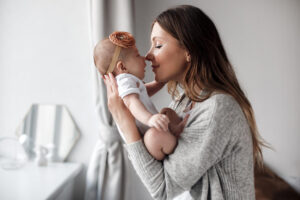Navigating a pregnancy after loss is often an emotional journey. Parents can experience feelings ranging from joy, hope and fear during this process.
At major milestones like learning you are pregnant again, it may be hard to avoid anxiety. But it is essential that both grief and joy should be seen as mutual experiences that should coexist rather than either/or situations.
1. Know Yourself
Pregnancy after loss can be an emotionally exhausting journey, full of both joy and pain. Expectations might fluctuate as your emotions fluctuate from hope and delight one moment to fear or fury the next – this is perfectly normal!
Grief is part of this process, and it’s OK to feel saddened that your new pregnancy does not erase past losses or provide guarantees for a successful outcome.
As it’s also alright to feel excited about a pregnancy, and share that excitement with others, finding an environment supportive of you such as friends, family or RTZ HOPE may help – just make sure they understand how serious pregnancy after loss is for you and don’t try telling everyone right away.
As your pregnancy continues, it is essential that you remember what is within your power (your decisions, how your body responds) and release what cannot – the outcome. When anxious thoughts surface, remind yourself that facts are what matter in this moment.
2. Know Your Options
People experiencing pregnancy after loss often face it with both hope and fear; it is completely valid to feel both emotions simultaneously. You may wonder whether you will be able to carry another pregnancy to term or whether another miscarriage will arise in this one too.
If you have experienced miscarriage or stillbirth, it is essential that you consult with a healthcare provider prior to trying again. Your physician can refer you to specialists in maternal-fetal medicine, genetics or reproductive endocrinology who will increase the chances of a healthy pregnancy and optimize chances for future pregnancies.
No matter if you are a parent survivor or support person, finding community can be challenging after pregnancy loss. While individual experiences vary considerably, there are hundreds of forums, support groups, parents-only options and nationwide grief and pregnancy loss organizations that can offer help and connection. It is also crucial that any underlying health issues be addressed prior to trying again as diabetes, high blood pressure or past STD history increases your risk for miscarriage.
3. Be Honest
People react in different ways when pregnant after loss. Some are supportive and understand the complex emotions that accompany this time in our lives, while others may make insensitive comments such as, “Oh, you’ll get pregnant again”, or even worse: “it was meant to happen”.
Discussing your loss with a health care provider can be helpful in processing all the emotions related to it, particularly if there are children involved. Discuss it all together as soon as appropriate in an age-appropriate way if applicable.
As appointments can be lonely experiences, having someone accompany you can provide much-needed companionship. Knowing someone will always be there as support and be an advocate in case anyone says anything inappropriate or offensive. Also helpful can be bringing along a journal which can be an outlet to express feelings; many women find this therapeutic in honouring both babies who were lost as well as living ones.
4. Take Care of Yourself
Pregnancy after loss can be an emotional experience that requires special consideration and care to navigate successfully. Self-compassion can be especially helpful at helping reduce feelings of anxiety and stress during this time.
Fear and anxiety are common during pregnancy after loss, yet it is important to realize these are normal, natural emotions which should not hinder you in being pregnant again. Talking with others who understand can also help – consider joining RTZ HOPE virtual pregnancy after loss support group for support during this journey.
Expectations is easy to create during this time, especially from those closest to us. They may mistakenly assume that because your belly has grown they see you are “back to normal” or that grieving for their loss has lessened due to this new pregnancy. But grief and joy do not exist in isolation from one another; it is okay for pregnant mothers to grieve while still expecting.
5. Get Support
Finding support during pregnancy after loss can be challenging. Finding a group of people that understand your journey may help, such as friends or family who have experienced loss themselves; support groups (like RTZ HOPE); counseling services specializing in miscarriage; or support services offering counseling specific to pregnancy loss counseling can all offer invaluable aid during this trying time.
Your emotions may vary from those around you; some days may bring great happiness while on others it can be more challenging to connect with people and find support – which is perfectly normal. Fear and anxiety are common experiences during pregnancy after loss; milestones such as receiving an all-clear from genetic testing, having a successful anatomy scan or giving birth often trigger these feelings of fear or anxiety.
At this point, it can also be challenging to manage people’s unrealistic expectations of you and pregnancy loss. They might assume that positive test results or healthy pregnancies somehow alleviate feelings of grief; therefore, it is essential that they recognize that such emotions are an inevitable part of this journey. It is crucial that they realize these are natural responses.





